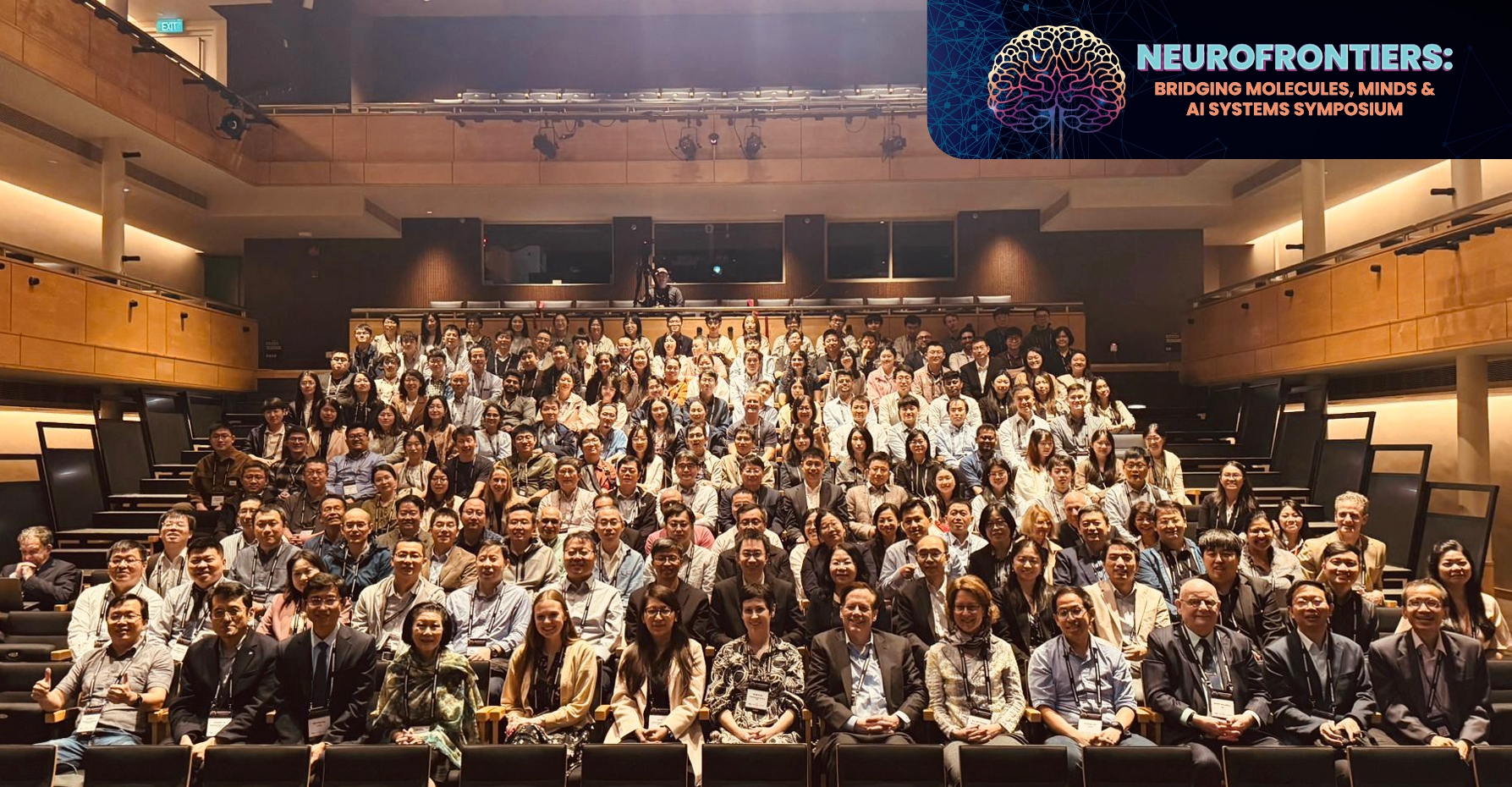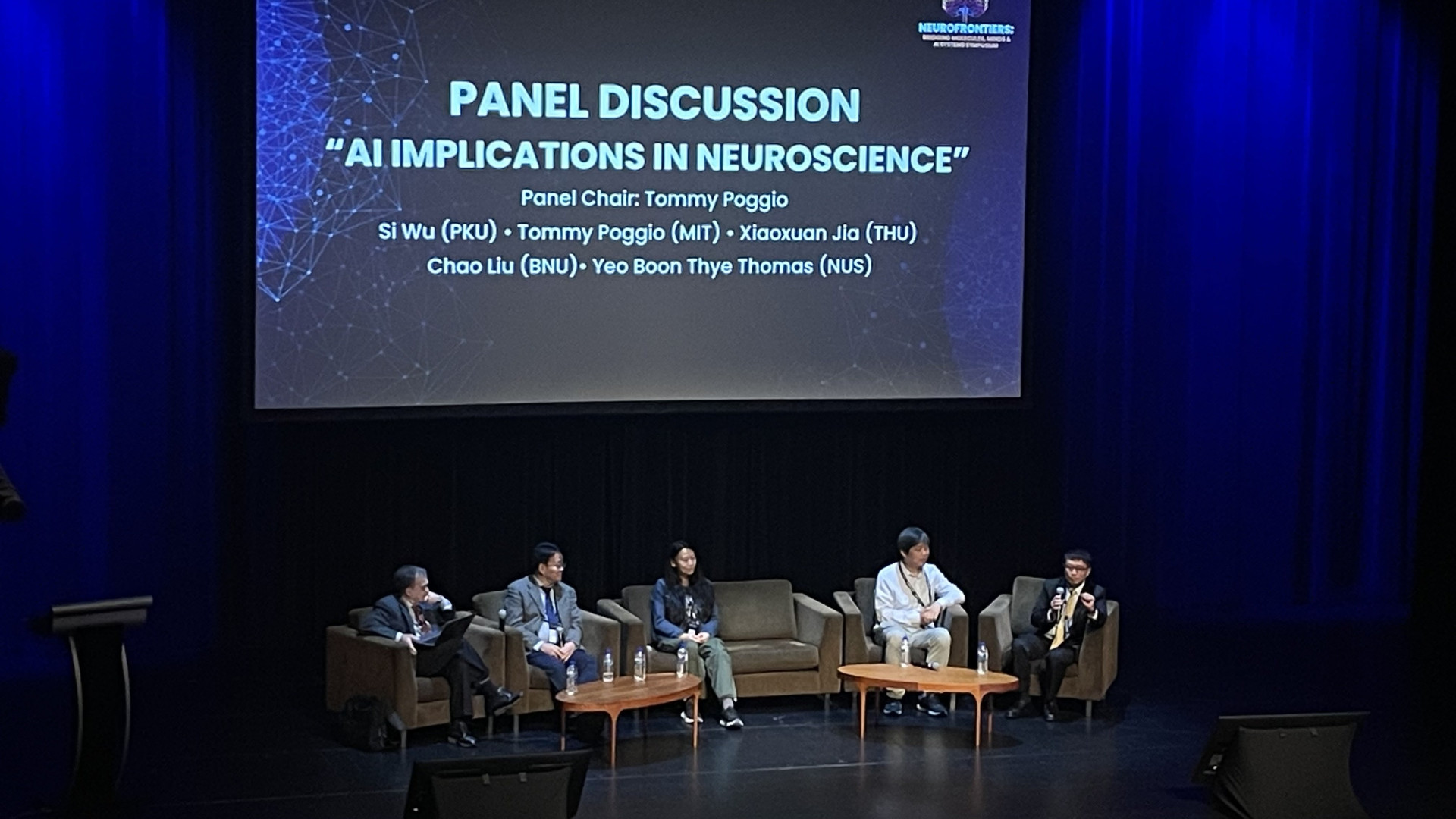
The inaugural NeuroFrontiers Symposium gathered leading neuroscience researchers from the USA, China and Singapore to engage in discussions and was a platform for forging partnerships and advancing research collaborations in neuroscience and artificial intelligence.
Neuroscience is a fast-evolving discipline that closely intersects with other fields - including immunology, metabolism, cancer, and more recently, artificial intelligence (AI) – driving new discoveries and innovations. These intersections reflect the importance of global collaboration in neuroscience, as researchers integrate emerging technologies like AI and computational models into their research.
Amidst this backdrop, the NeuroFrontiers Symposium, held from 21 to 22 January 2025 at the NUS University Cultural Centre, brought together top neuroscience researchers, stakeholders, and students from the USA, China and Singapore, providing a dynamic platform for advancing global collaboration in brain research, particularly through the adoption of cutting-edge technologies. The inaugural symposium was organised by the NUS Life Sciences Institute’s Neurobiology Research Programme in collaboration with IDG Capital, the McGovern Institute for Brain Research at the Massachusetts Institute of Technology (MIT) and the McGovern Institute in Beijing Normal University, Peking University and Tsinghua University. It was sponsored by The Tianqiao and Chrissy Chen Institute, IDG Capital (Singapore), and McGovern Institute.
“We are honoured to host this symposium and facilitate meaningful discussions among global experts in neuroscience and AI from MIT, China and Singapore, providing, a platform for enhanced global collaboration,” said Distinguished Professor Barry Halliwell from the Department of Biochemistry at the NUS Yong Loo Lin School of Medicine and Programme Leader of the Neurobiology Research Programme at the NUS Life Sciences Institute.
“This symposium will undoubtedly have a lasting impact on the future of neuroscience, shaping the direction of research and accelerating breakthroughs for years to come,” said NUS President Professor Tan Eng Chye in his welcome remarks.
Fostering global collaboration in neuroscience
Themed ‘Bridging Molecules, Minds, and AI systems’, the symposium underscored the critical role of cross-border partnerships in tackling grand challenges in neuroscience and AI. More than 240 participants attended the event, including leading experts in computational neuroscience, AI, and neural engineering. Key sessions of the symposium, such as keynote talks, panel discussions, and poster presentations, fostered collaboration and inspired new research initiatives.
Ms Lore McGovern, Co-founder and Board Member of the McGovern Institute for Brain Research at MIT, echoed the vital role of global collaboration, stating that "science and research collaboration reign above pretty much everything else” and that real power comes from “collaboration, respect, and friendship”.
Sessions at the symposium revolved around advancing global collaboration in neuroscience, particularly through emerging technologies like AI and computational models to drive brain research. The symposium also provided the opportunity for neuroscience researchers to present their work during the poster sessions, which generated enthusiastic discussions amongst participants.
Participants also appreciated the chance to engage in insightful discussions with leading neuroscience and AI experts during the panel discussions. One of the panel discussions, chaired by Prof Halliwell, covered the topic “Healthcare Impacts of Neuroscience”. The session highlighted breakthroughs in neuroimaging, brain-computer interfaces, and AI-driven diagnostics, emphasising the urgent need to revolutionise mental health care to better serve an ageing population.

Neuroscience experts, including Assoc Prof Thomas Yeo Boon Thye (extreme right), delved into the intersection of AI and neuroscience at the panel discussion titled ‘AI Implications in Neuroscience’, exploring the future of brain research and the use of emerging AI technologies.
Exploring intelligence, ethics, and the future of neuroscience and AI
Another highlight of the NeuroFrontiers Symposium was a panel discussion on “AI Implications in Neuroscience”, featuring leading global experts from psychology, computational neuroscience, and computer engineering.
One of the panellists, Associate Professor Thomas Yeo Boon Thye from the NUS Yong Loo Lin School of Medicine and the College of Design and Engineering at NUS, highlighted his work, which uses machine learning to develop individualised brain networks for precision psychiatry. He shared, “The hope is that we can use these individual-level networks for personalised brain stimulation and better treatment outcomes.”
Other leading experts, such as Professor Tomaso Poggio from MIT, Professor Wu Si from Peking University, Associate Professor Jia Xiaoxuan from Tsinghua University, and Professor Liu Chao from Beijing Normal University, also shared their perspectives on AI’s role in neuroscience research, the potential and limitations of brain-inspired computing, and the ethical concerns surrounding AI-driven intelligence.
The panelists agreed that while AI technologies such as deep learning have made rapid progress, understanding the human brain remains crucial for guiding AI’s development and addressing its shortcomings. Another key focus of the discussion was AI’s potential to advance neuroscience by improving brain modelling, disease prediction, and cognitive research. The panel concluded with a reflection on the ethical and societal implications of AI and the need for AI alignment.
Expanding global collaborations in brain research
The NeuroFrontiers Symposium successfully fostered meaningful dialogues and set the stage for deeper international partnerships in neuroscience and AI research. As AI technologies and brain science increasingly converge, global collaborations will be instrumental in driving the future of neuroscience innovation.